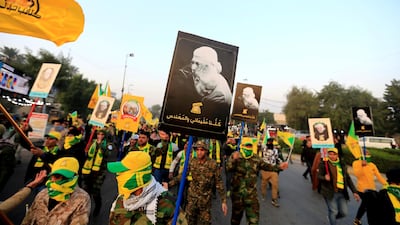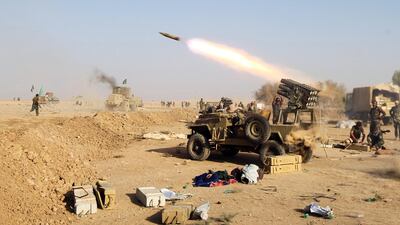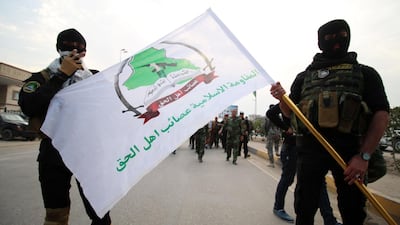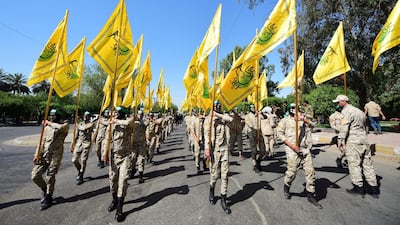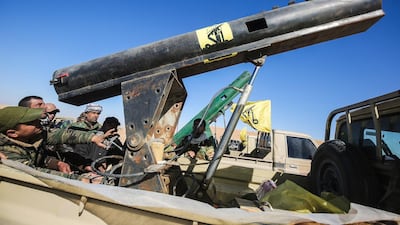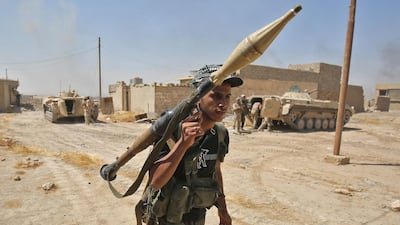The Iraqi government strongly condemned US air strikes on Iran-backed Shiite militia groups which killed four people on Monday, calling the attack a violation of its sovereignty.
Iraq's Foreign Ministry said it had opened an investigation into the strikes along the Iraq-Syria border, which the US said were aimed at facilities used by militia groups targeting US forces with weaponised drones.
"The ministry renews its rejection that Iraq is a place of conflict or confrontation, this is an assault and a violation," it said.
Iraqi military spokesman Brig Gen Yahya Rasool denounced the attack as a “flagrant aggression to the Iraqi sovereignty and national security as per all international accords”.
“Iraq renews its rejection to be an arena to settle scores,” he said.
He also called for “calm and to avoid any kind of escalation”, stressing that authorities will “launch a probe and make necessary communications at all levels to prevent such aggressions”.
Iraqi militia leaders said four fighters were killed in the early morning strikes. The targeted groups fall under the control of a government-sanctioned militia umbrella organisation known as the Popular Mobilisation Forces (PMF) and have vowed retaliation for the air strikes.
Pentagon spokesman John Kirby said the US forces “conducted defensive precision air strikes against facilities used by Iran-backed militia groups in the Iraq-Syria border region”.
PMF groups have carried out several deadly attacks against US forces since the end of Iraq’s war with ISIS, in which they both played a key role.
Some PMF groups, including one targeted on Monday known as Kataib Hezbollah, have been in conflict with the US since around 2008, before the official formation of the PMF.
Mr Kirby said the strikes targeted two locations in Syria and one in Iraq that were “utilised by Iran-backed militias that are engaged in unmanned aerial vehicle [UAV] attacks against US personnel and facilities in Iraq".
Another hardline militia, Kataib Sayyid Al Shuhada, was among the "several Iran-backed militia groups" that had used the targeted facilities”, he said.
The PMF confirmed the death of four fighters, saying the strikes hit three sites inside Iraqi territory about 13 kilometres from the border.
The fighters who died “were not involved in any activities against the presence of the foreign troops,” it said. It denied claims by the Pentagon that there were warehouses at the sites.
“We underline here that the aim of this aggression is to weaken Iraq, its security forces and Hashed Al Shaabi,” it added, using the Arabic name of the PMF.
Syria's state-run Sana news agency said a child was killed and at least three people were wounded in the strikes.
Although the Iran-allied militias are officially part of the PMF, they implement Tehran’s foreign policy goal of ousting US troops from Iraq.
They increased their attacks on US assets in Iraq after the US drone strike on January 3 last year that killed Qassem Suleimani, the commander of Iran’s Islamic Revolutionary Guard Corps’ Quds Force.
Iraqi militia leader Abu Mahdi Al Muhandis and several aides were also killed in the attack outside Baghdad airport.
Since then, the militias have staged bomb, rocket and, more recently, drone attacks against military bases, logistics convoys and the US Embassy in Baghdad.
Two militia leaders, speaking on condition of anonymity, confirmed to The National that four Iraqi fighters were killed in the attacks that occurred at 2am.
“We are fully prepared and at the disposal of the General Command to retaliate,” said Ahmed Al Maksosi, the leader of the Kataib Sayyid Al Shuhada’s 14th Brigade.
PMF-linked politician Ahmed Al Asadi described the attack as “perfidious aggression” and said “the blood that was shed will turn into an Iraqi outrage against the aggressor”.
The Pentagon said the attacks were carried out at the direction of President Joe Biden. It did not provide information on casualties.
"Given the ongoing series of attacks by Iran-backed groups targeting US interests in Iraq, the president directed further military action to disrupt and deter such attacks," Mr Kirby said.
Rising attacks
Since the start of the year, there have been more than 40 attacks against US interests in Iraq, where 2,500 American troops are deployed as part of the international coalition to fight ISIS.
These include 14 rocket attacks, but the majority have been bombings against logistics convoys – some of them claimed by pro-Iran factions that aim to pressure Washington into withdrawing all of its troops.
Monday's strikes are the second US attack on Iran-backed militias in Syria since Mr Biden took office in January.
In February, the US military launched air strikes on installations in the country's east.
The latest attack comes at a delicate moment as Washington and Tehran negotiate to revive a 2015 accord that capped Iran's nuclear activities.
The US and France said on Saturday that time was running out to return to the nuclear deal, and that Tehran's sensitive atomic activities could advance if the talks drag on.
A return to the 2015 accord with Iran has been a key Biden promise after his predecessor Donald Trump withdrew the US from the deal.
The UN nuclear watchdog said on Friday it had received no reply from Tehran over the extension of a temporary agreement covering inspections at Iranian nuclear sites, which expired on Thursday.
Meanwhile, Iraqi Kurdish officials said on Saturday three explosives-laden drones hit near the northern Iraqi city of Erbil, where the US has a consulate.
That attack occurred as the PMF held a military parade near Baghdad, attended by senior officials.
In April, a drone packed with explosives hit the coalition's Iraq headquarters in the military section of the airport in Erbil, the capital of the Iraqi Kurdish region.
The tactic is a headache for the coalition, as drones can evade air defences.
Mr Biden is scheduled to meet Israeli President Reuven Rivlin at the White House on Tuesday. Israel has been a strong critic of the nuclear deal.
